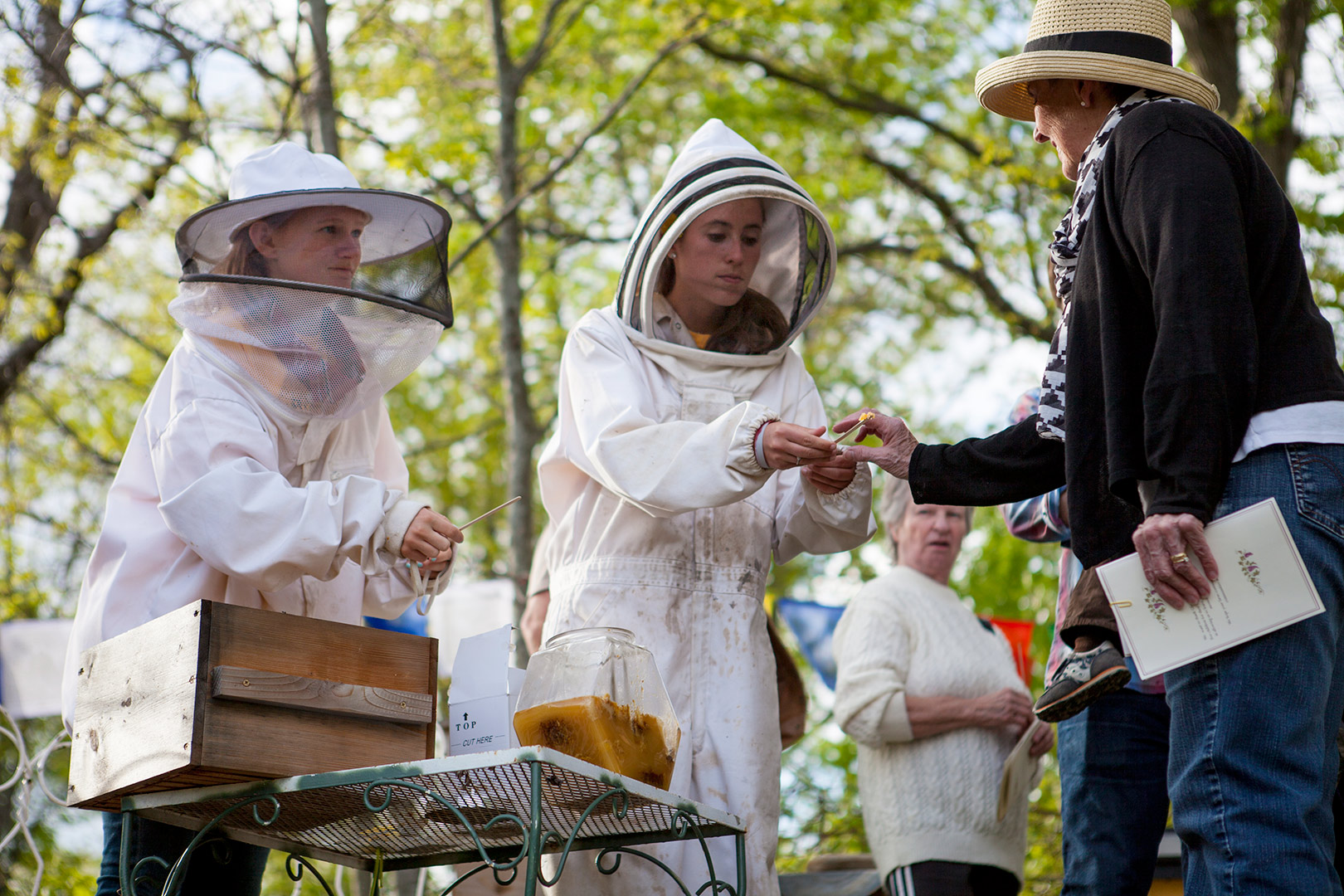
King Day speaker proposes path to reconcile environmental sustainability, justice advocates
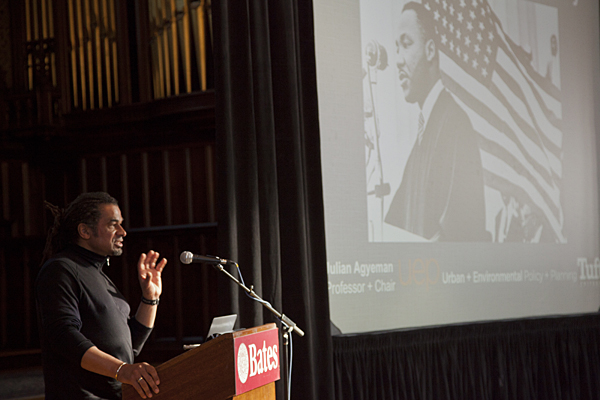
Environmental policy expert Julian Agyeman delivers his keynote MLK Day address in the Bates College Chapel. (Photographs by Phyllis Graber Jensen)
“Environmental quality and human equality are inextricably linked,” environmental policy expert Julian Agyeman stated in his keynote address for Bates’ Martin Luther King Jr. Day observances Jan. 16.
“True environmental well-being will only exist when there is human well-being.”
Environmental justice, a human-centered approach to environmentalism, was the theme of 2012 King Day activities at Bates. The Bates organizers proceeded upon the premise that, had he lived, civil-rights icon King’s attention to environmental justice wouldn’t have stopped with the Memphis sanitation workers and their demands for equality.
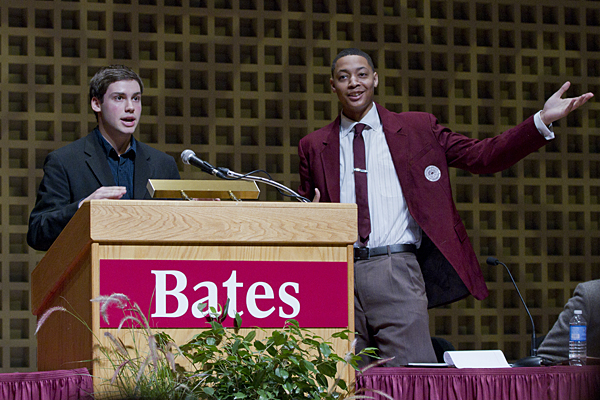
Bates and Morehouse debaters trade arguments before a packed Olin Arts Center Concert Hall audience.
As Agyeman and others made clear, environmental justice is no synonym for sustainability. Instead, it posits that true sustainability isn’t possible without human equality. The concept unified several days’ worth of events at Bates, including a Friday evening performance by environmental justice activist Marc Bamuthi Joseph, a weekend environmental film festival, and on Monday, in addition to Agyeman’s keynote, a full slate of workshops exploring the concept.
The theme may have gotten its most spirited treatment Monday afternoon during the annual Rev. Benjamin Elijah Mays ’20 Debate, in which debaters from Bates and Morehouse College, in a machine-gun battle of rhetoric before a packed Olin Concert Hall, explored the compatibility of environmental sustainability and social justice.
More about King Weekend events at Bates:
Performances by Marc Bamuthi Joseph
The King Memorial Service
Video: Agyeman delivers King Memorial Service Homily
MLK Slide Show on Flickr
Interim President Nancy Cable, Dean of the Faculty Pamela Baker ’70 and King Day Committee chair Charles Nero, professor of rhetoric and African American studies, also spoke during Monday morning’s keynote gathering in a filled-to-capacity College Chapel.
Cable introduced Agyeman, professor and chair of urban and environmental policy and planning at Tufts University, as “one of the world’s leading voices for environmental stewardship and justice.”
Agyeman started out by distinguishing between the sustainability and the environmental-justice movements. He characterized the former as focused on threats to the natural world, largely white and middle-class, deliberative and exclusive, in fact if not by design, because its privileging of expertise.
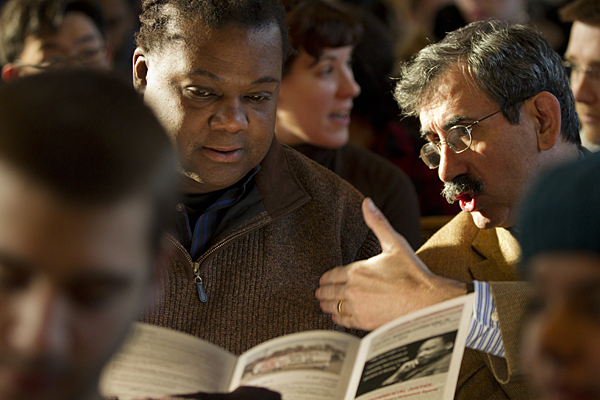
From left, Assistant Professor of African American and American Cultural Studies Myron Beasley and Professor of Spanish Balthazar Fra-Molinero discuss the MLK Day program while awaiting the keynote address.
Focusing on threats to human health and dignity, the latter is multicultural, disadvantaged, inclusive — and angry, as the poorest people continue to bear the brunt of environmental degradation.
The speaker plotted out a middle course between the two. The concept of “just sustainability,” which Agyeman originated with Robert D. Bullard and Bob Evans, calls for the establishment of a better quality of life for all, in a just and equitable manner, and respecting the limits of the ecosystems that support us.
He offered six examples of approaches to just sustainability:
- Urban design that fosters meaningful interaction between diverse cultural groups, as exemplified by the cities of London and Toronto. The field of urban planning, Agyeman said, does not now emphasize “cultural competence” — the understanding of diversity — in its education and practice. If our planners are not culturally competent, he asked, what hope is there for the creation of effectively intercultural cities?
- Enforceable levels of resource consumption that ensure a fair share for all — the tenet most likely to raise an outcry in the U.S., whose citizens represent only 4 percent of the world’s population but consume 25 percent of the world’s resources. “This is the most dangerous statistic on Earth,” said Agyeman. Unfair now, this disproportion will become a recipe for disaster as nations like China and India seek to emulate American standards of living.
- Basing the measurement of progress on factors like happiness and well-being, rather than economic metrics like gross national product. At the moment, he said, “we don’t measure what matters.”
- Promoting food justice and supporting urban agriculture.
- The sharing and co-production of resources and systems. Agyeman pointed to Zipcar, Wikipedia and other 21st-century phenomena as examples of facility and service models based on cooperation, collaboration and utility, which make efficient use of resources, rather than individual possession and entrepreneurship. “What we’re seeing is the beginning of a paradigm shift,” he said.
- Finally, “spatial justice,” which embraces such concepts as the equitable distribution of livable lands and the democratization of the streetscape.
“There’s always a social-justice element to sustainability questions,” Agyeman concluded. “To me, sustainable development and just sustainability mean using our unlimited mental resources, not our limited environmental resources.”
Baker used her time at the podium to review the promise and reality of Bates egalitarianism, and outlined current initiatives in the vital work of improving diversity and access at the college. In outlining the history of Bates’ King Day observances, Nero offered a shout-out to Sankofa, the student group whose Monday evening performance would be a highlight of the day.
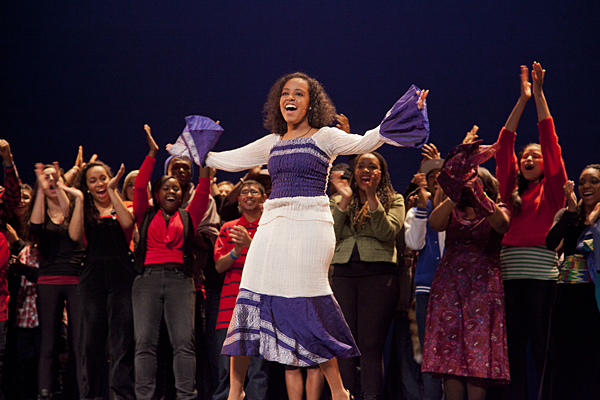
Sankofa director Bethel Kifle ’14 acknowledges appreciation from the Schaeffer Theatre audience and production’s cast at the end of the evening’s performance.
And in her welcome to the throng, which included Bates President-elect Clayton Spencer, Interim President Cable evoked the African philosophical concept of “ubuntu,” which she described as “the shared essence of our humanity,” or, in a translation by Liberian peace activist Leymah Gbowee, “I am what I am because of who we all are.”
Cable said, “We aren’t truly ourselves unless we are related to others.”

